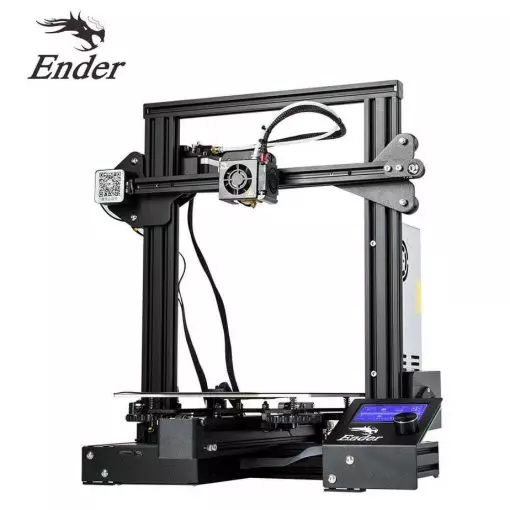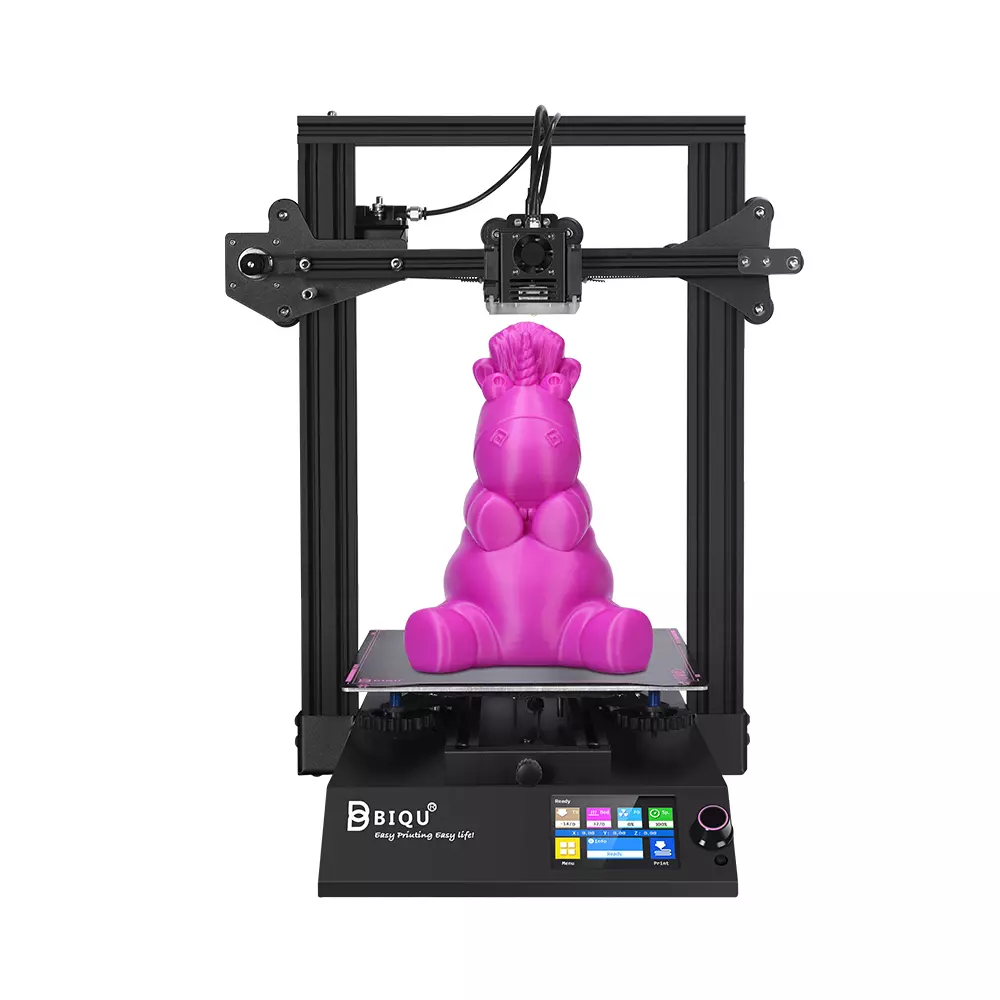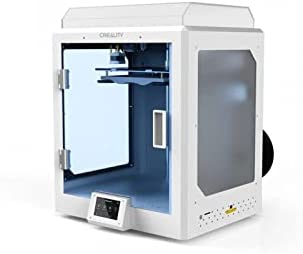Compare Ender 3 vs BIQU B1 vs CR5 PRO H
Comparison between the best 3D printers
Choose the best 3D printer at the best price. The cheapest 3D printers are here.
Buy a 3D printer here with 3D Fila.
 |
 |
 |
|
| Model | Ender 3[BUY Ender 3] |
BIQU B1 |
CR5 PRO H[BUY CR5 PRO H] |
| Printing Material | Filament | Filament | Filament |
| Estimated price | $210,00 | $269,00 | $1300,00 |
| Fabricante | Creality 3D | BigTreeTech | Creality 3D |
| Release Year | 2018 | 2020 | 2022 |
| Print Volume [mm] | 220x220x250 | 235x235x270 | 300x225x380 |
| Printer Size [mm] | 440x440x465 | 412x402x492 | 530x487x612 |
| Weight [kg] | 6,62 | 8,00 | 32,5 |
| Power Loss Recovery | NO | YES | YES |
| Enclosed printer | NO | NO | NO |
| Bed Leveling | Manual | Manual | Automatic |
| Filament End Sensor | NO | YES | YES |
| Bed type | Heated | Heated | Heated |
| Power supply system | Bowden | Bowden | Bowden |
| Standard nozzle | 0,4 | 0,4 | 0,4 |
| Maximum Nozzle Temperature [°C] | 255 | 250 | 300 |
| Maximum Bed Temperature [°C] | 110 | 100 | 100 |
| Maximum printing speed [mm/s] | 180 | 100 | 100 |
| Filament holder | YES | YES | YES |
| Camera for supervision | NO | NO | NO |
| Recommended filaments | PLA, TPU, ABS, PETG | PLA, TPU, ABS, PETG | PLA, PETG, Tritan, Flex, ABS |
| Recommended slicers | Cura, Simplify, Slic3r | Cura, Simplify, Slic3r | Cura, Simplify, Slic3r, IdeaMaker |
| Maximum Resolution [mm] | 0,1 | 0,1 | 0,1 |
| Processor | 8 bits | 32 Bits BTT SKR V 1.4 | ATMEGA 2560 |
| Display | Mono | Touchscreen TFT 3,5'' | Display touchscreen 4,3'' |
| Power Supply | 24V / 270W | 24V / 360W | 110/220V / 350W |
| Connectivity | SD / USB | SD / USB | SD / USB |
| Operating systems | Windows, Mac, Linux | Windows, Mac, Linux | Windows, Mac, Linux |
| Date of registration in the system | 2021-04-13 | 2021-04-14 | 2022-11-04 |
| Release date | 2018 | 2020 | 2022 |
| Extra features | The Ender 3 V1 is a DIY assembly 3D printer, a sales leader since 2017, standing out for its cost-benefit. With a wide printing capacity, it has a CNC machined structure for precision and stability. It offers high-precision prints with low noise, thanks to its innovative V-profile and pulleys. It has a self-adhesive magnetic platform for easy removal of models and excellent adhesion. The Ender 3 heats up quickly, reaching 100°C in 5 minutes, ideal for agile prints. It includes protection against power failures, allowing you to resume printing after interruptions, saving time and material. | The BIQU B1 is an advanced 3D printer with a silent 32-bit BTT SKR V1.4 motherboard and ARM Cortex-M3 CPU, offering DIY interfaces (I2C, SPI, WiFi) and dual Z-axis. Its dual BTT B1 TFT35 V3.0 operating system allows real-time monitoring and multiple printing modes, including G-code visualization effects. It stands out for its BIQU SSS (Super Spring Steel), ensuring easy model adhesion and simplified removal, with the possibility of using it on both sides. It includes a filament sensor, automatically pausing printing in case of filament breakage. The multicolored RGB lights integrated into the hotend allow you to view the printing status even at night. Additional notes include the need for a BIQU-specific Type-C cable and extra interfaces for smart filament sensor and BL Touch. | The Creality CR-5 PRO H 3D Printer stands out with a high-temperature nozzle (up to 300°C), a 300 x 225 x 380mm print volume, and a closed chamber for thermal stability. It includes BLTouch auto-leveling, a carbon-crystal silica glass base for easy model grip and removal, a filament sensor, and a resume print function. It has a 4.3-inch touchscreen interface, quiet operation, an attractive design, and is pre-assembled, ideal for technical materials. |
| Support for multiple colors and materials (AMS and CFS) | NO | NO | NO |
Notes * |
|||
| Cost-benefit | 6 / 10 | 7 / 10 | 6 / 10 |
| Hardware | 0.5 / 10 | 2 / 10 | 3.5 / 10 |
| Screen | . | . | . |
| Print volume | 3 / 10 | 3 / 10 | 4 / 10 |
| Performance | 1 / 10 | 1 / 10 | 1 / 10 |
| [BUY Ender 3] | [BUY CR5 PRO H] |
Conclusion |
| In comparing the Ender 3, BIQU B1, and CR5 PRO H 3D printers, a clear distinction emerges between value, features, and print capabilities. The **Ender 3**, positioned as the most cost-effective option, excels in providing a reliable introduction to 3D printing. With its reasonable print volume, it is ideal for hobbyists and those new to the field. While lacking advanced features such as filament sensors and power loss recovery, its strong cost-benefit ratio and ease of use make it a popular choice among entry-level users. The **BIQU B1** offers a compelling middle ground, introducing features like dual Z-axis support and an effective filament sensor, which enhances printing reliability. Its advanced motherboard and silent operation contribute to a smoother user experience, all while maintaining a competitive price point. However, its print volume falls slightly short compared to the CR5 PRO H, positioning it as a versatile option but perhaps less ideal for larger projects. On the higher end of the spectrum, the **CR5 PRO H** stands out with its own set of advanced features, including a higher maximum nozzle temperature and automatic bed leveling, making it well-suited for printing with a variety of materials. Despite its superiority in features and construction, the significant price difference may not justify the investment for all users, particularly those who may not require such high-performance capabilities. In conclusion, the best printer largely depends on the user’s needs. For budget-conscious individuals looking for solid performance, the Ender 3 is a winner. Those requiring more advanced functionality but at a reasonable price will find the BIQU B1 appealing. For professionals or serious hobbyists who prioritize material versatility and advanced features, the CR5 PRO H offers the best performance, albeit at a significantly higher cost. Each printer serves a unique market segment, and selecting the right one will depend on balancing budget, features, and intended applications. |

